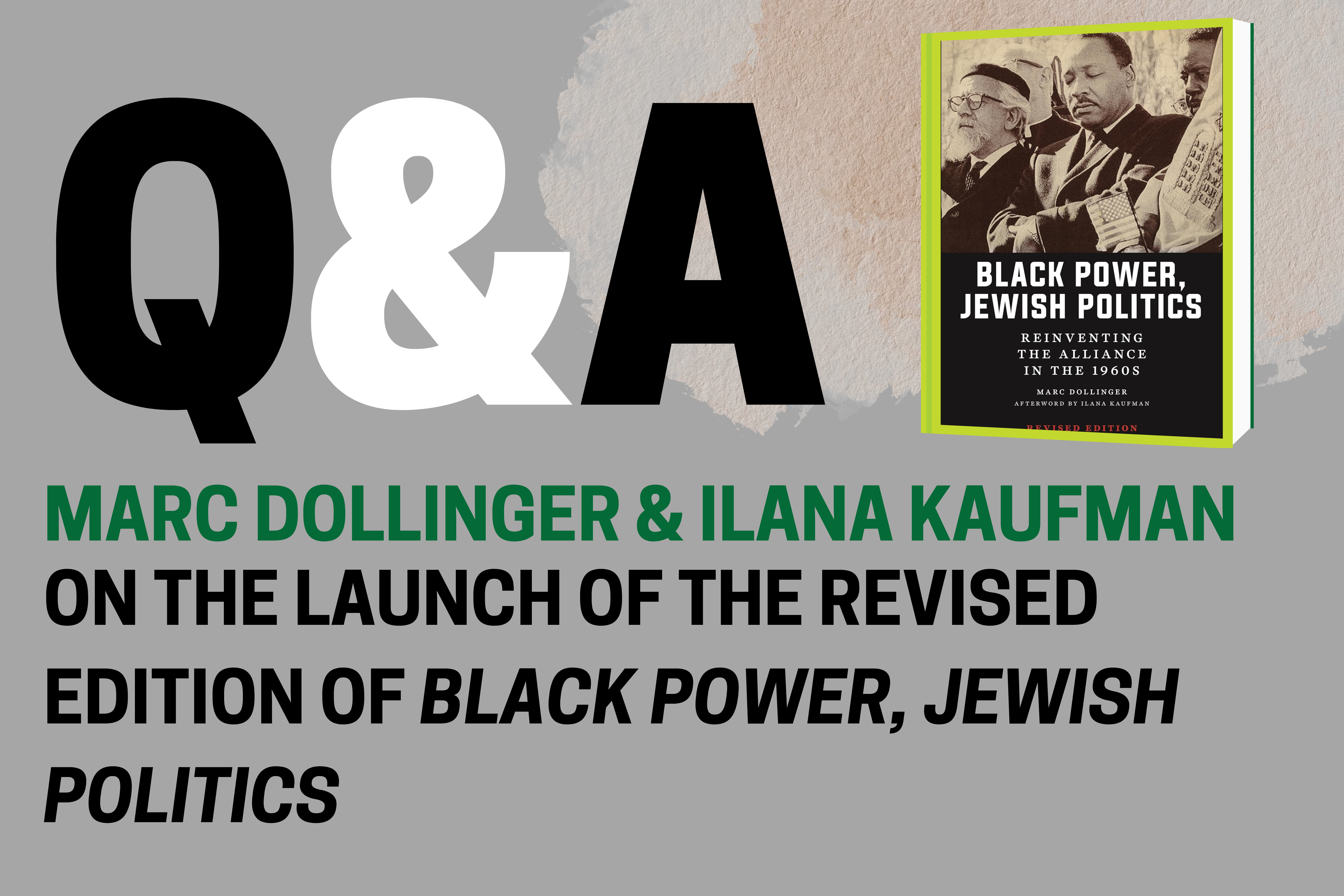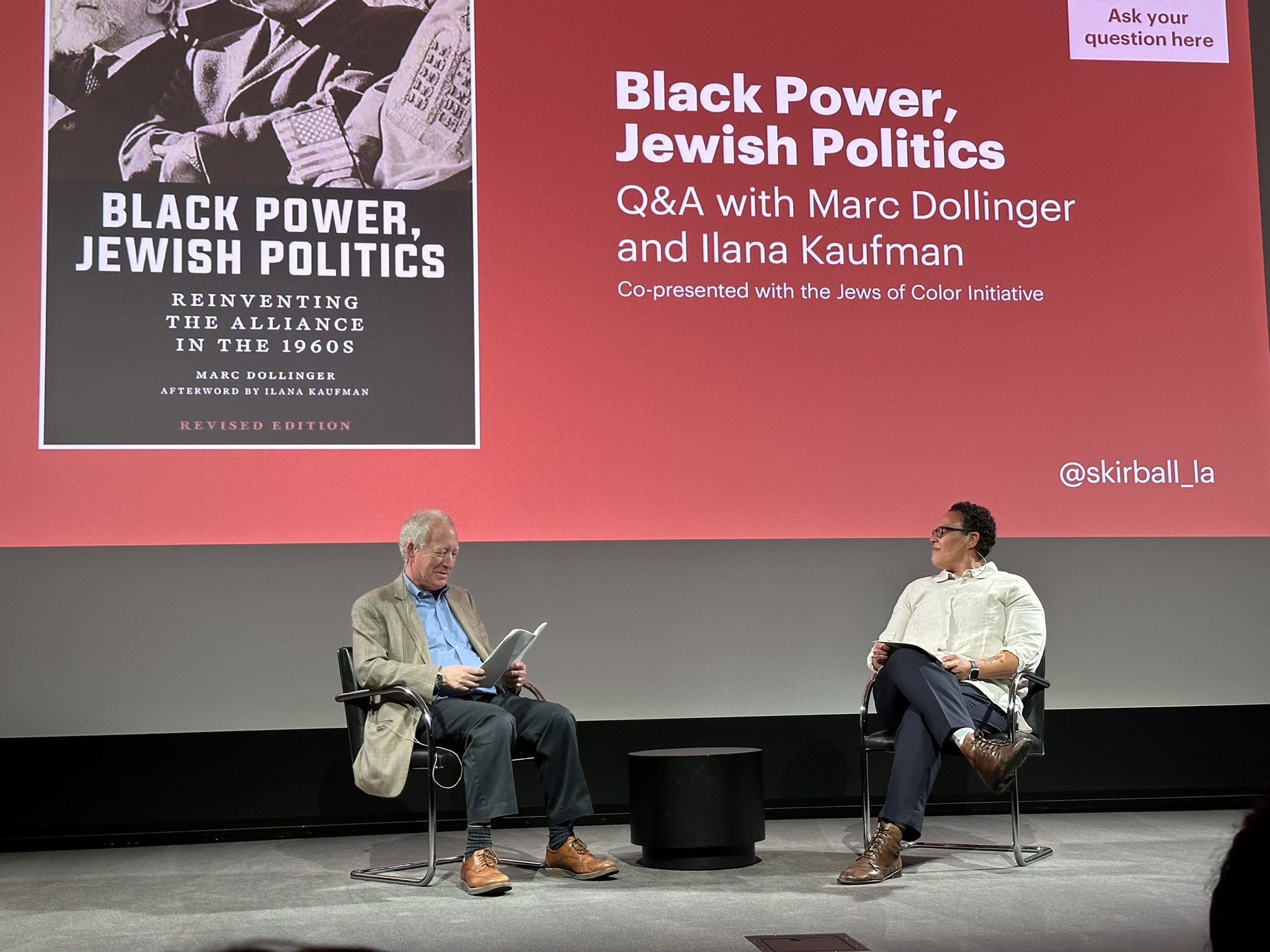
On April 17, 2024, the Skirball Cultural Center in Los Angeles was abuzz with excitement as a multigenerational, multiracial audience with diverse professional backgrounds gathered in a beautiful event space. They welcomed one another into the room with joy for the launch of the revised edition of Black Power, Jewish Politics: Reinventing the Alliance in the 1960s. Authored by Marc Dollinger, Richard and Rhoda Goldman Endowed Chair in Jewish Studies and Social Responsibility at San Francisco State University, the revised edition of this book was indelibly shaped by Dollinger’s thought partnership with the JoCI’s CEO, Ilana Kaufman, reflected in her self-authored Afterword for the book and evident in Dollinger’s gratitude for her contributions beyond the written page.
Following this successful and energizing event, we sat down with Dollinger and Kaufman to learn more about the book, their thought partnership, and their reflections on the powerful gathering at Skirball.
Read the Q&A below to learn the story behind the revised edition of Black Power, Jewish Politics and how Dollinger and Kaufman became co-conspirators in the work of re-telling history.
How did you connect, and how did your professional relationship evolve?
IK: We first met when I was a program officer at the San Francisco Federation Endowment Fund [Jewish Community Federation and Endowment], and one of my areas of work was in lay-leader participatory grantmaking in Marin County. Marc was on a Marin planning committee. We quickly realized the overlap in our interests—my work on whiteness, racial privilege, and what’s now called DEI, and Marc’s similar work in academia and interest in lay leadership. I invited Marc to speak at several sessions on Jews, race, whiteness, and privilege, which helped us build a strong professional relationship.
MD: Our professional relationship grew even more when I was chairing the demographic study committee, and Ilana was a staffer who attended committee meetings. This set us on a path of a larger dialogue about the community’s role in research.
IK: I got to observe all aspects of how to develop a demographic study. In some ways I was learning about things that would one day become building blocks of the pedagogy we use at the JoCI. I watched Marc navigate personalities and power, and talk about topics like racial diversity. I was learning how to advance JoC representation inside the Jewish communal space. It was like a course in demography. I was part of conversations about ethics related to conducting demographic studies, like whether or not the community should be involved in defining the research questions.
What is the story behind creating the revised edition of Black Power, Jewish Politics? What needed to change after the first edition?
MD: The revised edition came about because the original publishers censored the new preface that they had previously requested and approved. They took issue with my use of the terms “white supremacy” and that the text made an apology to Jews of Color. As a result, Brandeis University Press gave me the legal rights to the book back, and I decided to publish the revised edition with NYU Press, on the condition that they include the new preface. I wanted to ensure that the book addressed critical issues of race and privilege within the Jewish community.
IK: Observing the conflict over the new preface was fascinating. It involved white Jewish scholars debating each other about issues of white supremacy, privilege, and racism. Jews of Color were largely observers of the debate. Marc’s insistence on addressing these topics forced a deep, and sometimes uncomfortable, conversation among white Jews about their own privilege and power. But People of Color, Jews of Color, were not involved in that conversation.
Can you each speak a little bit about lessons or perspectives that you have gained from working with one another?
MD: Ilana taught me the importance of inserting oneself into the narrative. I realized that my whiteness and maleness were already deeply embedded in my work, and it’s essential to acknowledge this. Ilana also sensitized me to the concept of gatekeepers in scholarship and Jewish life. I’ve become strongly anti-gatekeeper because they often cause harm by limiting access and opportunities.
IK: Marc taught me about how to put the valued partnerships between academic scholars and field scholars into practice. Authentic collaborations create a dynamic exchange of knowledge that benefits both the field, and the academy, and ultimately the community itself because we are able to produce richer and more nuanced knowledge. Marc’s approach to collaboration gave me permission to engage with his academic work as a leader in the nonprofit sector, which has been incredibly empowering. This partnership has enriched my understanding of Jewish history and strengthened my commitment to Jewish leadership.

What were some key moments or highlights from the launch of the revised edition of Black Power, Jewish Politics?
MD: The most exciting moment for me was when I walked out and saw the audience. It was diverse. It felt like the future of American Jewish life, but I quickly realized this was actually the Jewish present. The diversity of the audience and their engagement with the topics discussed was profound. Book sales were significantly higher than usual, which I attribute to the audience’s resonance with the issues we addressed.
IK: The Skirball environment itself was gorgeous, and the energy in the room was fantastic. People chose to sit up front and fully engage from the start. It was almost like everybody who came to the event at Skirball was being expected by somebody else. Wouldn’t it be incredible if everything in Jewish life felt like someone’s been waiting for you to arrive? The event was a magnet in some ways, and it felt like no one had to leave any part of themselves at the door. The energy was amazing and you could just feel the genuine connection folks were making to each other and to the work.
MD: Another highlight was seeing this audience engage with the critique I received from Ilana. We have often facilitated sessions together or side-by-side and the response from the audiences when she poses a criticism is usually white fragility. But this time, instead of turning to fragility, people, including other white men, allowed themselves to be drawn into the conversation and left with a lesson about how to remain self-reflective in this work.
IK: The event was multigenerational and racially diverse, including Black Jews, Jews of Color, people of color who were not Jewish, white Jews and allies. To Marc’s point, it takes intentionality and effort to bring the Jewish community together in that way, which was beautifully executed by the JoCI’s Arya Marvazy and Grace Osborne, and the folks at Skirball. But the energy, the experience, happened because of the incredible community—the right people doing the right thing for the right reasons. Just look at what kind of magic manifested at the Skirball. Imagine what would be possible if we brought that kind of intentionality to everything we do as Jews?
